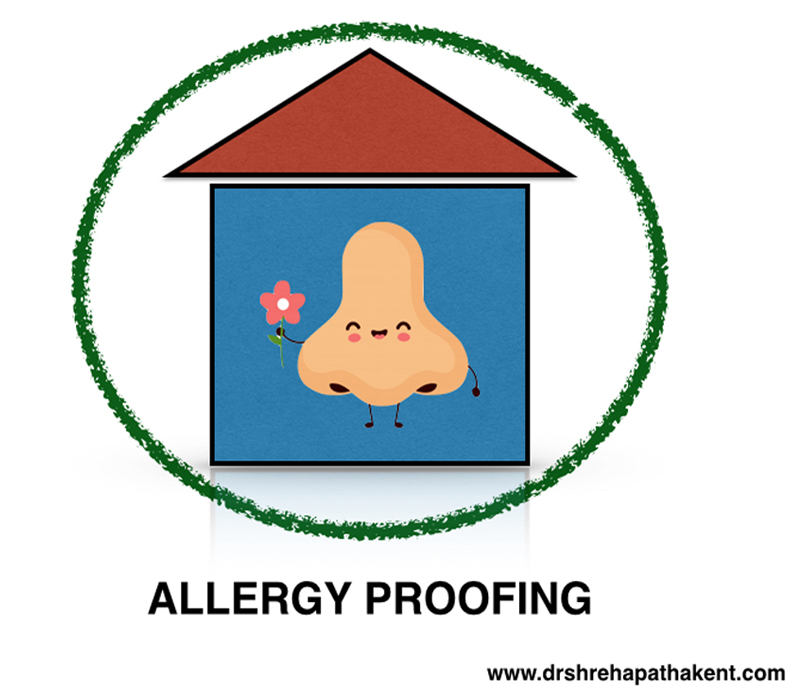Allergy can occur when our immune system overreacts to a harmless substance (allergens) considering it to be harmful. The body considers allergens as pathogens and produces antibodies in the blood. These trigger the release of chemical mediators, that produces allergic reactions.
• Can occur throughout the year
[Dust mites/ Pet hairs/ Indoor molds/ Insects]
• Can be seasonal
[Pollen from grass and trees/ Airborne molds]
• Can be specific to particular environment
[Such as in bakery from flour]
Allergens and Irritants
• An allergen is any substance, most often eaten or inhaled, that is recognised by the immune system as harmful and causes an allergic reaction.
• Irritants are substances that can trigger allergy-like reactions on exposure to them.
• Irritants can worsen the allergies.
• Irritants are different for different person, and symptoms caused by them varies from person to person.
Knowing the Allergens

Seasons and Allergens

Knowing the Irritants

Understanding the Symptoms

Allergy or Common Cold

Diagnosing Allergy
• Typical symptom
• Family history
• Blood tests for specific antibodies
• Prick/Scratch test to pin point the allergens
Treating Allergy
• Antiallergic tablets/ Nasal sprays based on clinical picture
• Advanced treatment: Immunotherapy/Allergy shots
Avoiding allergens is the best possible way to control allergy.
Allergy Proofing
(Avoiding the allergens)
1. Leave the outdoors outdoors
When coming into the house after spending whole day outside, allergens on hair, skin and clothes are likely.
• Leave footwear at the door.
• Change of clothes.
• Take a shower.

2. Seasonal pollen control
• Limit outdoor activities in the morning and dusk, when pollen counts are high.
• Keep windows closed in seasons when pollen counts are high.
• Change/clean the filters in heating/cooling systems as allergy season approaches.
3. Dust control

Carpets
• Replace carpets.
• If replacing carpet is not feasible, vacuum frequently.
Fans
• Fans stir up dust, so avoid it.
• Use air conditioning instead.
• If using fans, clean the blades regularly.
Beddings
• Encase pillows, mattresses in dust-mite-proof covers.
• Wash sheets, pillowcases and blankets once a week at high temperature.
• Wash comforters or cover them.
Furniture
• Avoid upholstered furniture.
• Use furniture that can be wiped clean.
• Vacuum frequently if any upholstered furniture.
Curtains
• Use washable curtains made of plain cotton or synthetic fabric.
• Replace dust-collecting horizontal blinds with washable rollertype shades.
Wet mop/ vacuum the floor regularly.
Clean the shelves/ counter tops with damp cloth regularly.
Wear a mask and gloves when cleaning and vacuuming.
Clutter
• Remove items that collect dust, such as tabletop ornaments, books and magazines.
• Store children’s toys, games and stuffed animals in plastic bins.
4. Molds control
• Keep the house dry.
• Don’t leave wet clothes in the washing machine.
• Don’ t have too many indoor plants especially in the bedroom.
• If keeping any potted plant, cover the soil in the pots with gravels.
• Fix any leaks or seepage at home, indoors and out.
• Scrub clean the molds off sinks/basin/toilet and plumbing fixtures regularly.
• Use exhaust fans in the kitchen and bathroom.
• Avoid humidifiers.

5. Pets control
• Avoid pets if you have allergies.
• If you have pets and don’t want to lose them, keep them out of the bedroom, because that’s where we spend much of our time.
• Bathe your pets regularly.
• Try to keep them off upholstered furniture.

6. Pest and rodent control
• Fix leaks.
• Keep food in sealed containers.
• Don’t leave out dirty dishes.
• Clean the kitchen thoroughly after meals.
• Take out the garbage regularly.
• Block any openings through which cockroaches could enter from outside (windows, wall cracks, and floor gaps).
• Professional pest/rodent control if needed.

7. Avoiding Irritants
• No smoking.
• Avoid strong odours like perfume/paint/solvents/chemicals.
• Consider covering with mask while passing by areas with smoke/fumes.
8. Better Immunity
• Eat healthy.
• Stay hydrated.
• Exercise/yoga regularly.
In case nose develops symptoms of allergy, consult and start antiallergic treatment as per medical advice.


